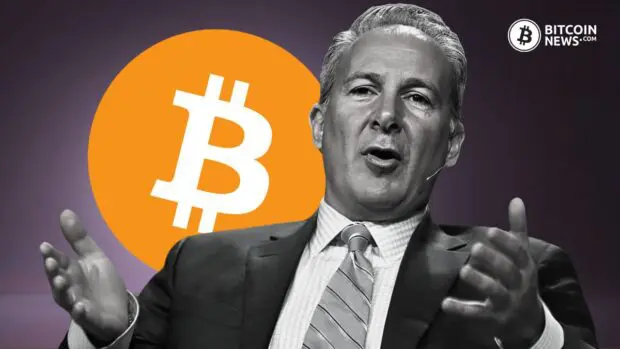Renowned financial commentator and ardent bitcoin critic Peter Schiff remains steadfast in his skepticism towards the leading digital asset. He took to social media platform X on January 24 to express his persistent doubts about the legitimacy and value of bitcoin.
Peter Schiff bitcoin criticism centers around his belief that Bitcoin lacks inherent value, describing it as a creation with artificial scarcity. He contends that the perceived value of Bitcoin is a result of collective pretense, with individuals buying into it as its price rises. According to Schiff:
“Here is how bitcoin works. We create something with no value, then artificially limit its supply. Then we all pretend it has value and buy it. Other people see the price going up and they buy it too. Then we all keep HODLing it hoping everyone keeps pretending it has value.”
In a subsequent tweet, Schiff acknowledged that his critique could be applied to any currency but drew a distinction between fiat currency and bitcoin. He argued that fiat currency, unlike bitcoin, serves a practical purpose as a medium of exchange and unit of account.
Schiff emphasized that fiat currency is universally required for paying taxes, providing it with a tangible utility that, in his opinion, Bitcoin lacks.
The Bitcoin Community Reacts to Peter Schiff Bitcoin Criticism
Schiff’s comments triggered a range of responses from the Bitcoin community on X. Some users likened Schiff’s description of Bitcoin to his views on gold, suggesting that both assets derive their value from collective agreements.
Others pointed out the historical evolution of money, emphasizing that all forms of currency gain value through collective agreement, provided they meet specific criteria such as scarcity and divisibility. Dave Weisberger, the CEO of CoinRoutes, stated:
“Bitcoin, backed by the world’s largest computer network which is used to convert ENERGY into value, is still only valuable if people agree it has value. Unlike previous stores of value, it is easily divisible, portable & transferable in the digital world and is provably scarce & verifiable without the need to trust a third party to transactions.”

Comments on Spot Bitcoin ETFs’ Performance
On a separate note, Schiff also recently shared his outlook on the performance of the newly launched spot bitcoin Exchange-Traded Funds (ETFs). Notably, despite the anticipation of a bull market after the Securities and Exchange Commission’s (SEC) approval of the spot bitcoin ETFs, bitcoin’s price witnessed a downward trajectory. Notably, it dropped below $40,000 on Monday and $39,000 on Tuesday.
According to Schiff, all spot bitcoin ETFs are now in bear markets, defined by a drop of 20% or more from the peak. He highlighted the Fidelity Wise Origin Bitcoin Fund (FBTC) as “the biggest loser,” down 32%.
Schiff contended that the approval of spot bitcoin ETFs did not create additional demand but simply shifted existing demand. Bloomberg analyst Eric Balchunas urged Schiff to give these products some more time.
Schiff argued:
“Investors who might have bought actual bitcoin, bitcoin-related equities like MSTR or GBTC, are simply buying the new ETFs instead. Rearranging the deck chairs won’t stop the ship from sinking.”
Earlier this month, Schiff warned of a speculator selloff and minimal institutional demand for spot bitcoin ETFs. He also predicted that SEC Chair Gary Gensler would introduce stringent digital asset regulations that could further negatively impact the price of bitcoin.
As the debate between traditional finance figures and the digital asset community continues, Schiff’s comments add fuel to the ongoing discussions surrounding the legitimacy and future prospects of Bitcoin and the broader market.










